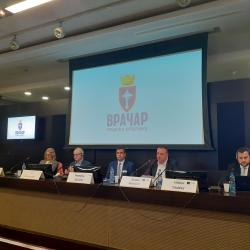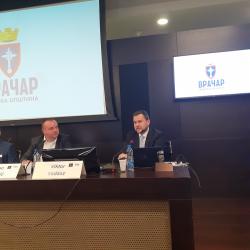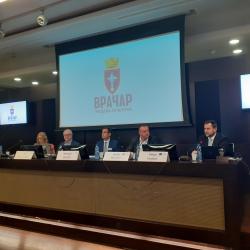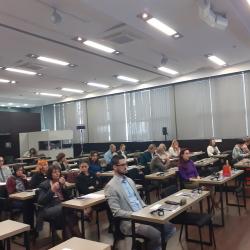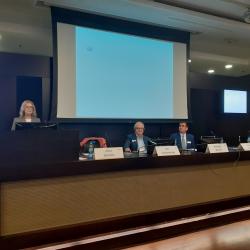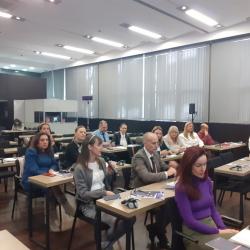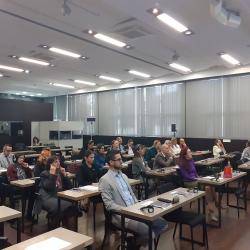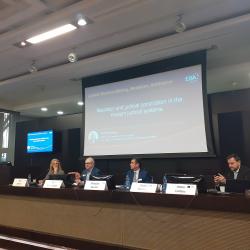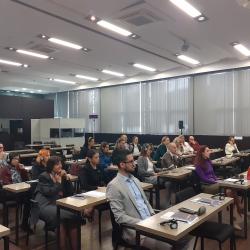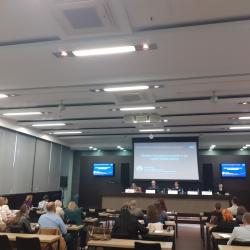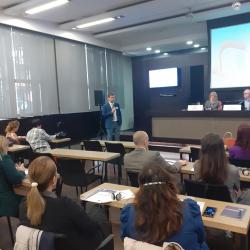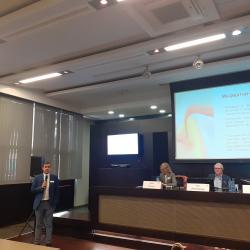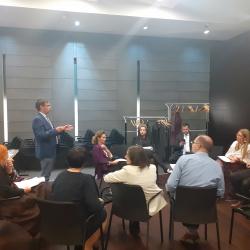"Judicial Decision Making, Mediation, Arbitration" organized by the Judicial Academy and the Academy of European Law (ERA)
The Judicial Academy is in cooperation withAcademy of European Law (ERA), on October 29 in Belgrade, organized a one-day seminar for judges on the topic of "Court decision-making, Mediation, Arbitration".
The seminar was opened by the program director of the Academy of European Law (ERA) Viktor Vadász and v.f. director of the Judicial Academy Srđan Pavličić.
Mr. Vadász thanked the Judicial Academy for the many years of successful cooperation and pointed out that the aim of this seminar is to highlight the importance of mediation as an alternative way of resolving disputes and the opportunities that mediation offers for the legal professions in Serbia, as well as for the general public, and that the contributions of international and domestic experts, with professional experience in judicial decision-making and mediation, will enable the exchange of experiences and a better understanding of mediation.
At the very beginning, Mr. Pavličić expressed his sincere gratitude to the Academy of European Law (ERA) for its long-term support and cooperation. Joint efforts to improve the competences of holders of judicial functions in the field of EU law is an invaluable contribution to strengthening the rule of law, the application of legal standards and the harmonization of judicial practice and alignment with the positive examples of practice of the European Court of Human Rights and the European Court of Justice in Luxembourg.
He pointed out that today we will talk about two topics that are extremely important for contemporary trends judicial development, global trends and social order, namely mediation and arbitration.
Mediation is a bridge between law and trust, between court proceedings and human agreement. Its wider application would significantly contribute to the relief of the courts, enable faster and more efficient resolution of disputes, and provide the parties with the opportunity to participate themselves in finding solutions that are legally based and viable. Although its importance is indisputable, unfortunately, we must admit that it has not yet sufficiently taken root in domestic judicial practice.
Special importance of mediations it exists both in civil and in certain family cases, where dialogue is crucial, but no less so in commercial disputes - because it facilitates business, preserves corporate relations and contributes to market stability. Any dispute resolved through mediation and agreement instead of court proceedings and judgment is a win for all parties to the proceedings, as well as for the state, society and the legal system as a whole.
When it comes to arbitration, its role in modern society, especially in the field of commercial law, is immeasurable. In the time of social transition and the ubiquitous trend of globalization of everything, including the market, the rapid development of international trade and therefore the ever-present need for legal certainty in business, arbitration is an indispensable mechanism for the peaceful and successful resolution of commercial disputes. It provides the parties with an efficient, professional and confidential way of resolving disputes, while respecting the specifics of economic relations and the needs of the business community. By strengthening arbitration, we also strengthen the legal security of business entities, encourage investments and contribute to the development of a healthy business environment in Serbia.
That is why continuous professional development and monitoring of contemporary national and international court practice is extremely important. Colleagues from the countries of the European Union have developed a rich judicial practice in the field of alternative dispute resolution, whose experience and models can be valuable in comparative legal practice and the development of training programs for the further professional development of holders of judicial functions.
The Judicial Academy has recognized the importance of training in these areas and has organized and implemented a large number of trainings for many years.
One of the objectives of the Judicial Academy is precisely to continuously develop curricula that follow modern trends and the educational needs of holders of judicial functions, because, as has been repeatedly emphasized, only educated and professional personnel can meet the demands of the modern judiciary, have integrity and be independent in their work.
The key topics covered at the seminar were:
- Mediation and judicial conciliation in modern judicial systems (Key principles of mediation and judicial conciliation; Brief overview of mediation as a mechanism of ADR (alternative dispute resolution) and form of mediation; Role and skills of mediators)
- EU legal framework for ADR and the Mediation Directive (Mediation Directive (Directive 2008/52/EC); Voluntary or mandatory mediation? Case law of the Court of Justice of the EU)
- The legal framework of mediation in Serbia (2019 attempt to introduce the Italian model; Current legal framework and practice; Announcement of the new legislative framework)
- Practical advice regarding the mediation process (Different stages of the mediation process; Opening the procedure and building trust; Scope and limits of confidentiality)
- Exercise (role-play) - subject from family law and subject from commercial law
The presenters at the seminar were:
- Nina Betetto, judge of the Supreme Court of Slovenia, former president of the CCJE, mediator and certified trainer of mediators
- Nebojša Đuričić, judge of the High Court in Belgrade, mediator and certified trainer of mediators
- Avi Schneebalg, Lecturer and mediator, former Belgian civil judge, co-founder and former vice-president;
- Viktor Vadász, Program Director of the Academy of European Law, former Hungarian judge

